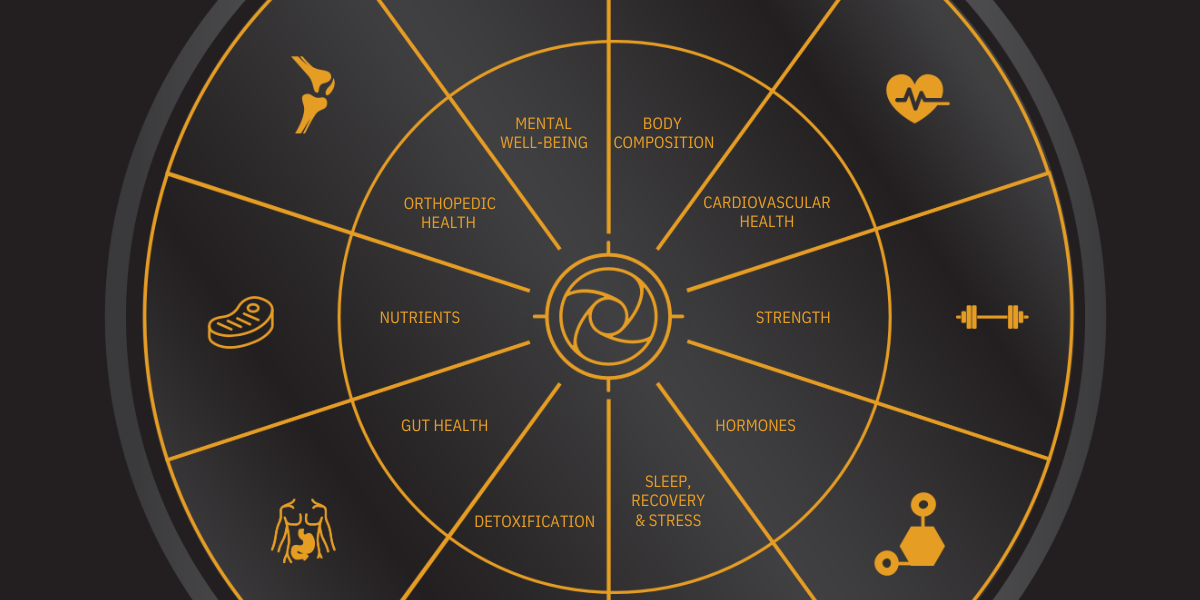Contraception: How to Not Have Babies Yet Perform at Your Best
Contraception: How to Not Have Babies Yet Perform at Your Best
.png?width=70&height=70&name=Stark_LogoMark%20(1).png)
Aging significantly impacts hormone levels in the body, leading to various physiological changes, including decreased sex hormones, insulin sensitivity, melatonin reduction and more. Understanding these changes can help manage symptoms and maintain health through lifestyle adjustments, medical interventions, and hormone replacement therapies if necessary.
The process of aging and the ever-evolving metabolism is a challenge everyone will face at some point — our hormones affect how we feel, look, and perform throughout our lives. This is why hormones are one of the 10 spokes on our Wheel of Health. We had the opportunity to chat with Dr. Jade Teta about hormones, aging, and how to slow down the aging process!
Hormones play a significant role in the process of aging. When our physiology decides that we don’t need our hormones anymore in our early twenties, we begin experiencing age-related hormonal and metabolic changes that contribute to a decline in physiological functions.
Dr. Teta says, “Basically, everything our metabolism and physiology is doing is trying to create offspring so our DNA and genes can live on. Historically speaking, that was supposed to happen in a very specific range of time — pretty much from the time we hit puberty into (at the very latest) about thirty years old. When you take that understanding and go back hundreds of years in human physiology, most of us were doing everything that we needed to do for the species by the time we were in our early twenties. In modern times, we’re pushing that clock way back and expecting our physiology to keep up.”
Our bodies produce a potent hormonal response in our early twenties, which peaks shortly after and then begins to decrease function with age. Our body believes it has no actual use to keep us in our prime starting in our mid-twenties. Still, we can extend our reproductive capacity and functional fitness abilities by understanding the science behind metabolism.
Dr. Teta says, “After we’ve gone through our prime, what can we then do to begin to delay the aging process? It comes down to managing stress and metabolic tension. How can we get enough nutrients to convince our body that we are still young, and not overtax our system so that our body still thinks we can recover? That is the game that we’re playing with aging.”
Dr. Teta believes the best way to look at aging is to view it as the metabolism’s automatic stress software. As we age, there’s a down regulation in our digestive enzymes, so incorporating these necessary enzymes into our diets will slow down the aging process.
Dr. Teta recommends finding a vitamin or meal replacement shake with essential vitamins and minerals — look for shakes with ingredients ending with -ase and high amounts of B vitamins. He says that high-quality whey protein shakes have the best biological value for protein, as most vegan proteins lack a number of essential amino acids like leucine. One of the best ways to find a beneficial supplement is to examine the label for carbohydrate, protein, and fiber levels. A high-quality shake will have different digestive enzymes in it — helping keep your metabolism functioning optimally.
Do you remember sleeping for long periods during puberty and your early twenties? You were working hard and resting hard. As we age, we develop the belief that we need to constantly work really hard to be successful. Here’s the thing: people who are not in their prime should be resting more!
Dr. Tate says, “The fact of the matter is you can not out will or outlast your hormonal physiology. Instead of working harder, you have to work much smarter. That means pushing hard when you can, then resting, recovering, and regenerating more than you would have when you were younger.”
While you should undoubtedly still work hard, you should begin to rest more- but rest can be more than laying in bed all day or spending the entire evening on the couch. Dr. Tate recommends spending time in the sauna, doing mobility and stability work, getting massages, and participating in other relaxing activities when you can. Your hard work should be directed, smart, and intense — but not at the expense of the metabolism.
Perhaps the best way to delay the effects of aging is to stay engaged! You can stay engaged by moving, traveling, learning, challenging yourself with physical pursuits in the gym, and being sexually active regularly. When you’re active and remain engaged, it signals the body that you’re young and vital — delaying the aging process!
Contraception: How to Not Have Babies Yet Perform at Your Best
You’ve probably noticed changes in your brain as you’ve aged — like having difficulty remembering where you put the car keys, having trouble...

At Stark, we believe that true health encompasses far more than just physical fitness. It's about achieving a harmonious balance across all aspects...